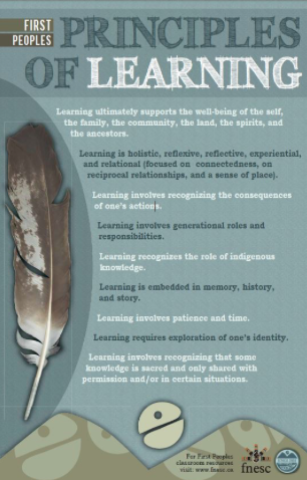Using the First Peoples Principles to Guide Our Practice
An Introduction to the First People’s Principles of Learning
The First Peoples Principles of Learning describes a set of learning principles specific to First Peoples. These were articulated by Indigenous Elders, scholars, and knowledge keepers to guide the development of the curriculum created by the BC Ministry of Education and First Nations Education Steering Committee.
They represent an attempt to identify common elements in the varied teaching and learning approaches that prevail within particular First Nations societies. It must be recognized that they do not capture the full reality of the approach used in any single First Peoples’ society.
From The First Nations Education Steering Committee www.fnesc.ca
After discussing the results from the student forums and staff surveys, we agreed that the First Peoples Principles of Learning would be the best tool to guide our practice. We are using these principals to support us in creating professional development for staff and to guide us in our decision making. Evidence of how these principles are being used in our school story can be found in our School Story in Action segments in the Week Ahead notices, on this site, and in displays around the school.
The principles are:
1. Learning Ultimately supports the well-being of the self, the family, the community, the land, the spirits and the ancestors.
2. Learning is holistic, reflexive, reflective, experiential and relational (focused on connectedness, on reciprocal relationships, and a sense of place).
3. Learning involves recognizing the consequences of one's actions.
3. Learning involves generational roles and responsibilities.
4. Learning recognizes the role of indigenous knowledge.
5. Learning is embedded in memory, history, and story.
6. Learning involves patience and time.
7. Learning requires the exploration of one's identity.
8. Learning involves recognizing that some knowledge is sacred and only shared with permission and/or in certain situations.
